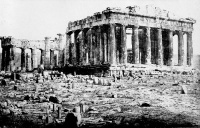Greece
From The Art and Popular Culture Encyclopedia
|
Aristotle, Plato, Homer, El Greco, hetaera, Lais of Corinth, Lais of Hyccara, Priapus, Ado Kyrou, Greece on the Ruins of Missolonghi, Giorgio de Chirico |
|
Related e |
|
Featured: |
Greece is a country in Southern Europe, considered the cradle of Western civilization, being the birthplace of democracy, Western philosophy, the Olympic Games, Western literature, historiography, political science, major scientific and mathematical principles, and Western drama.
From the eighth century BC, the Greeks were organised into various independent city-states, known as polis, which spanned the entire Mediterranean region and the Black Sea. Philip of Macedon united most of the Greek mainland in the fourth century BC, with his son Alexander the Great rapidly conquering much of the ancient world, spreading Greek culture and science from the eastern Mediterranean to the Indus River.
Greece was annexed by Rome in the second century BC, becoming an integral part of the Roman Empire and its successor, the Byzantine Empire, wherein the Greek language and culture were dominant. The Greek Orthodox Church also shaped modern Greek identity and transmitted Greek traditions to the wider Orthodox World. Falling under Ottoman dominion in the mid-15th century, the modern nation state of Greece emerged in 1830 following a war of independence. Greece's rich historical legacy is reflected by its 18 UNESCO World Heritage Sites.
Ancient Greece
The term ancient Greece refers to the period of Greek history lasting from the Greek Dark Ages ca. 1100 BC and the Dorian invasion, to 146 BC and the Roman conquest of Greece after the battle of Corinth. It is generally considered to be the seminal culture which provided the foundation of Western civilization. Greek culture had a powerful influence on the Roman Empire, which carried a version of it to many parts of Europe. The civilization of the ancient Greeks has been immensely influential on the language, politics, educational systems, philosophy, science, and arts, giving rise to the Renaissance in Western Europe and again resurgent during various neo-Classical revivals in 18th and 19th century Europe and the Americas.
Philosophy
Most western philosophical traditions began in Ancient Greece in the 6th century BC. The first philosophers are called "Presocratics," which designates that they came before Socrates, whose contributions mark a turning point in western thought. The Presocratics were from the western or the eastern colonies of Greece and only fragments of their original writings survive, in some cases merely a single sentence.
A new period of philosophy started with Socrates. Like the Sophists, he rejected entirely the physical speculations in which his predecessors had indulged, and made the thoughts and opinions of people his starting point. Aspects of Socrates were first united from Plato, who also combined with them many of the principles established by earlier philosophers, and developed the whole of this material into the unity of a comprehensive system.
Aristotle, the most important disciple of Plato, shared with his teacher the title of the greatest philosopher of antiquity. But while Plato had sought to elucidate and explain things from the supra-sensual standpoint of the forms, his pupil preferred to start from the facts given us by experience. Except from these three most significant Greek philosophers other known schools of Greek philosophy from other founders during ancient times were Stoicism, Epicureanism, Skepticism and Neoplatonism.


